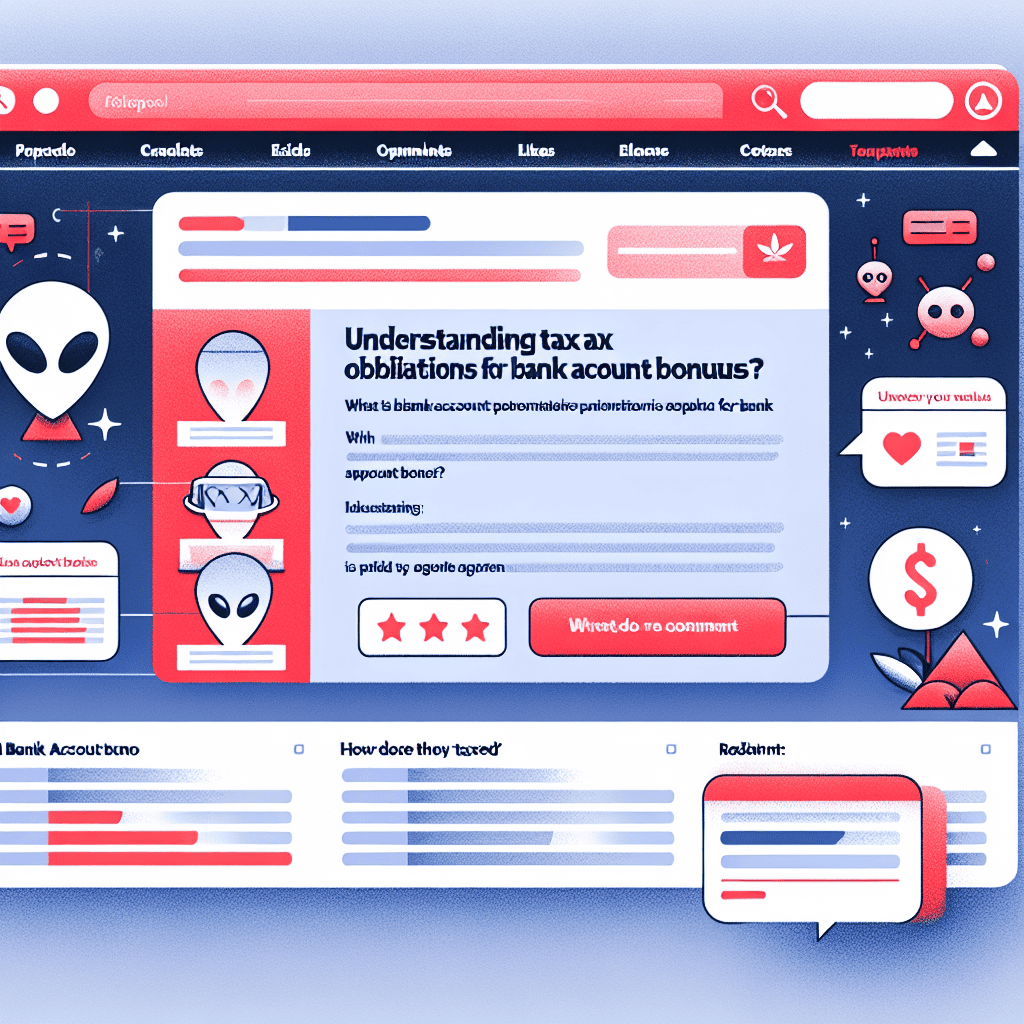“Navigate Your Bonus: Mastering Tax Insights on Reddit Now!”
Introduction
This week on Reddit, discussions have been buzzing around the often-overlooked topic of tax obligations related to bank account bonuses. As financial institutions frequently offer enticing bonuses to attract new customers, many individuals are left wondering about the tax implications of these seemingly “free” incentives. Understanding how these bonuses are classified by the IRS and how they should be reported on your tax return is crucial to avoid any unexpected liabilities. Redditors are sharing insights, personal experiences, and expert advice to help navigate the complexities of reporting these bonuses as taxable income, ensuring compliance and financial peace of mind.
Overview Of Tax Implications For Bank Account Bonuses
In recent discussions on Reddit, the topic of tax obligations for bank account bonuses has garnered significant attention, reflecting a growing interest in understanding the financial implications of these incentives. As banks compete to attract new customers, they often offer bonuses for opening new accounts or meeting specific criteria. While these bonuses can be enticing, it is crucial for individuals to recognize that they are not merely free money but rather taxable income that must be reported to the Internal Revenue Service (IRS).
To begin with, it is important to understand what constitutes a bank account bonus. Typically, these bonuses are offered as a cash incentive for opening a new account, maintaining a minimum balance, or setting up direct deposits. Although these offers can provide a financial boost, they are considered interest income by the IRS. Consequently, they are subject to taxation, much like the interest earned on a savings account. This classification as taxable income means that individuals must report these bonuses on their tax returns.
Transitioning to the reporting process, banks are required to issue a Form 1099-INT to account holders who receive $10 or more in interest income, including bonuses, over the course of a year. This form is crucial for tax reporting purposes, as it details the total amount of interest income earned, which must be included in the individual’s tax return. It is essential for taxpayers to ensure that the information on the Form 1099-INT matches their records to avoid discrepancies that could trigger an audit.
Moreover, understanding the tax implications of bank account bonuses extends beyond merely reporting them as income. These bonuses can potentially affect an individual’s overall tax liability. For instance, receiving a substantial bonus could push a taxpayer into a higher tax bracket, thereby increasing their tax rate. Additionally, it is important to consider the impact on state taxes, as some states may have different rules regarding the taxation of interest income.
Furthermore, Reddit discussions have highlighted the importance of strategic planning when it comes to bank account bonuses. Some users suggest timing the receipt of bonuses to align with other financial activities, such as charitable donations or retirement contributions, which can help offset the additional tax burden. By strategically managing their finances, individuals can potentially minimize the impact of these bonuses on their overall tax situation.
In addition to planning, it is advisable for individuals to consult with a tax professional to fully understand their obligations and explore potential strategies for managing their tax liability. A tax advisor can provide personalized guidance based on an individual’s unique financial situation, ensuring compliance with tax laws while optimizing their financial outcomes.
In conclusion, while bank account bonuses can be a lucrative opportunity, it is imperative for individuals to be aware of the associated tax obligations. By understanding that these bonuses are considered taxable income and must be reported to the IRS, individuals can avoid potential pitfalls and ensure compliance with tax regulations. Engaging in strategic financial planning and seeking professional advice can further aid in managing the tax implications of these bonuses, ultimately allowing individuals to make informed decisions and maximize their financial benefits. As discussions on Reddit continue to shed light on this topic, it is clear that awareness and education are key to navigating the complexities of bank account bonuses and their tax implications.
Reporting Bank Bonuses On Your Tax Return
In recent discussions on Reddit, the topic of tax obligations related to bank account bonuses has garnered significant attention. As financial institutions increasingly offer enticing bonuses to attract new customers, understanding the tax implications of these incentives becomes crucial. While these bonuses can be a lucrative opportunity for consumers, they also come with specific tax responsibilities that must be addressed to ensure compliance with federal regulations.
To begin with, it is essential to recognize that the Internal Revenue Service (IRS) considers bank account bonuses as taxable income. This classification stems from the fact that these bonuses are typically awarded in exchange for meeting certain conditions, such as maintaining a minimum balance or setting up direct deposits. Consequently, they are treated similarly to interest income, which is subject to taxation. As such, individuals who receive these bonuses must report them on their tax returns.
Transitioning to the practical aspects of reporting, it is important to note that banks are required to issue a Form 1099-INT to customers who receive $10 or more in interest income, including bonuses. This form provides a detailed account of the interest earned, which must be included in the recipient’s taxable income for the year. However, even if the bonus amount is less than $10 and a 1099-INT is not issued, the recipient is still obligated to report it. This requirement underscores the importance of maintaining accurate records of all financial transactions throughout the year.
Moreover, understanding the nuances of how these bonuses are taxed can help individuals better manage their financial planning. For instance, the tax rate applied to bank bonuses is generally the same as the individual’s ordinary income tax rate. Therefore, it is advisable for recipients to consider the potential tax impact when deciding whether to pursue such offers. By doing so, they can avoid unexpected tax liabilities that may arise during the filing season.
In addition to federal tax obligations, it is also prudent to consider state tax implications. While most states follow federal guidelines in taxing interest income, there can be variations in how these rules are applied. Therefore, consulting with a tax professional or utilizing reliable tax software can provide clarity on state-specific requirements and ensure comprehensive compliance.
Furthermore, the discussions on Reddit highlight a common misconception that bank bonuses are akin to gifts and thus non-taxable. It is crucial to dispel this myth, as the IRS explicitly categorizes these bonuses as income rather than gifts. This distinction is vital for taxpayers to understand, as misreporting income can lead to penalties and interest charges.
In conclusion, as bank account bonuses continue to be a popular financial incentive, understanding the associated tax obligations is essential for consumers. By recognizing these bonuses as taxable income, accurately reporting them on tax returns, and considering both federal and state tax implications, individuals can navigate their financial responsibilities with confidence. Engaging in informed discussions, such as those on Reddit, can further enhance awareness and promote responsible financial practices. Ultimately, staying informed and proactive in managing tax obligations can lead to a more secure and compliant financial future.
Differences Between Cash Bonuses And Interest Income
In the realm of personal finance, understanding the nuances of tax obligations is crucial, particularly when it comes to bank account bonuses. Recently, discussions on Reddit have highlighted the complexities surrounding these bonuses, specifically the differences between cash bonuses and interest income. As individuals seek to maximize their financial benefits, it is essential to comprehend how these two forms of income are treated differently under tax regulations.
To begin with, cash bonuses offered by banks as incentives for opening new accounts or meeting certain criteria are considered taxable income. These bonuses are typically provided as a one-time payment and are often used by banks to attract new customers. From a tax perspective, the Internal Revenue Service (IRS) classifies these bonuses as “other income,” which means they must be reported on your tax return. The bank will usually issue a Form 1099-MISC if the bonus exceeds $600, but even if it does not, the responsibility to report the income remains with the taxpayer. This classification underscores the importance of keeping accurate records of any bonuses received throughout the year.
In contrast, interest income is generated from the funds deposited in a bank account over time. This type of income accrues as a result of the bank paying interest on the balance held in the account. Unlike cash bonuses, interest income is reported on a Form 1099-INT, which banks are required to issue if the interest earned is $10 or more. The distinction between cash bonuses and interest income is significant because they are reported on different forms and may be subject to different tax treatments. While both are taxable, the way they are documented and the thresholds for reporting differ.
Moreover, the tax implications of these two types of income can vary based on an individual’s overall financial situation. For instance, cash bonuses might push a taxpayer into a higher tax bracket if they significantly increase the individual’s total income for the year. On the other hand, interest income, which is typically smaller and accrues gradually, may have a less pronounced impact on one’s tax liability. Understanding these differences is vital for effective tax planning and ensuring compliance with tax laws.
Furthermore, it is important to consider the potential for state taxes on both cash bonuses and interest income. While federal tax obligations are a primary concern, state tax laws can also affect how these forms of income are taxed. Some states may have different thresholds or rules for reporting and taxing bank account bonuses and interest income. Therefore, staying informed about both federal and state tax requirements is essential for accurate reporting and minimizing potential penalties.
In conclusion, the discussions on Reddit this week have shed light on the importance of distinguishing between cash bonuses and interest income when it comes to tax obligations. By understanding how these two types of income are classified and reported, individuals can better navigate their tax responsibilities. As financial incentives from banks continue to evolve, staying informed and proactive in managing these obligations will ensure compliance and optimize financial outcomes. Whether dealing with cash bonuses or interest income, a thorough understanding of the associated tax implications is indispensable for sound financial management.
Strategies To Minimize Tax Liability On Bonuses

In recent discussions on Reddit, the topic of tax obligations for bank account bonuses has garnered significant attention, particularly as individuals seek strategies to minimize their tax liability on these bonuses. As financial institutions increasingly offer enticing bonuses to attract new customers, understanding the tax implications of these incentives becomes crucial. While these bonuses can provide a welcome financial boost, they are not without their tax responsibilities. Therefore, it is essential to explore strategies that can help mitigate the tax burden associated with these bonuses.
To begin with, it is important to recognize that bank account bonuses are generally considered taxable income by the Internal Revenue Service (IRS). This means that when a bank offers a cash bonus for opening a new account or meeting certain criteria, the amount received is typically subject to federal income tax. Consequently, individuals must report these bonuses as part of their gross income when filing their tax returns. Failure to do so can result in penalties and interest charges, making it imperative to accurately report all such income.
One effective strategy to minimize tax liability on bank account bonuses is to carefully time the receipt of these bonuses. By strategically planning when to open new accounts or fulfill bonus requirements, individuals can potentially defer the receipt of bonuses to a tax year in which they anticipate being in a lower tax bracket. This approach can be particularly beneficial for those who expect fluctuations in their income, as it allows them to manage their overall tax burden more effectively.
Additionally, individuals can explore the possibility of offsetting the taxable income from bank bonuses with deductions or credits. For instance, contributing to a retirement account, such as a traditional IRA or 401(k), can reduce taxable income, thereby lowering the overall tax liability. Similarly, taking advantage of available tax credits, such as the Earned Income Tax Credit or the Child Tax Credit, can further mitigate the impact of bank bonuses on one’s tax obligations.
Moreover, it is advisable to maintain meticulous records of all bank account bonuses received throughout the year. This includes keeping track of any 1099-INT forms issued by banks, as these documents provide a record of interest and bonus income that must be reported to the IRS. By maintaining accurate records, individuals can ensure that they are fully prepared to report their income correctly and avoid any potential discrepancies during tax season.
Furthermore, consulting with a tax professional can provide valuable insights and personalized strategies for managing tax obligations related to bank account bonuses. Tax professionals can offer guidance on the most effective ways to report bonus income, identify potential deductions or credits, and ensure compliance with all relevant tax laws. Their expertise can be particularly beneficial for individuals with complex financial situations or those who receive substantial bonuses from multiple financial institutions.
In conclusion, while bank account bonuses can be an attractive financial incentive, they come with tax obligations that must be carefully managed. By understanding the tax implications and employing strategies to minimize tax liability, individuals can make the most of these bonuses without incurring unnecessary financial burdens. Through careful planning, record-keeping, and professional guidance, taxpayers can navigate the complexities of bank account bonuses and optimize their overall tax situation. As discussions on Reddit have highlighted, being informed and proactive is key to successfully managing tax obligations in this context.
Common Misconceptions About Taxing Bank Bonuses
In recent discussions on Reddit, a platform known for its diverse and vibrant community, the topic of tax obligations related to bank account bonuses has sparked considerable interest. Many users are eager to understand the nuances of how these bonuses are taxed, yet there remains a significant amount of confusion and misinformation. This article aims to clarify common misconceptions surrounding the taxation of bank account bonuses, providing a clearer picture for those navigating this financial landscape.
To begin with, it is essential to recognize that bank account bonuses are generally considered taxable income by the Internal Revenue Service (IRS) in the United States. These bonuses, often offered as incentives for opening a new account or meeting specific account requirements, are treated similarly to other forms of income. Consequently, they must be reported on your tax return. Despite this clear guideline, many individuals mistakenly believe that these bonuses are exempt from taxation, perhaps due to their promotional nature or the relatively small amounts involved.
One prevalent misconception is that if a bank bonus is less than a certain amount, it does not need to be reported. However, the IRS requires all income, regardless of the amount, to be reported unless explicitly stated otherwise. Banks typically issue a Form 1099-INT or 1099-MISC for bonuses that exceed $10, but even if you do not receive such a form, you are still obligated to report the income. This misunderstanding often leads to unintentional non-compliance, which can result in penalties or interest on unpaid taxes.
Another common misunderstanding is the belief that bank bonuses are not taxable if they are received in the form of points or miles rather than cash. While it is true that the IRS has not provided explicit guidance on the taxation of points or miles, the general consensus is that if these rewards are received as a result of spending, they are not taxable. However, if they are awarded as a bonus for opening an account, they may be considered taxable income. This distinction is subtle yet crucial, and failing to recognize it can lead to incorrect tax reporting.
Furthermore, some individuals assume that because bank bonuses are promotional, they fall under the category of gifts, which are not taxable. This is a misconception, as the IRS does not consider bonuses from banks to be gifts. Gifts are typically given out of generosity or affection, without any expectation of receiving something in return. In contrast, bank bonuses are provided as part of a business transaction, with the expectation that the customer will meet certain conditions, such as maintaining a minimum balance or setting up direct deposits.
To navigate these complexities, it is advisable for individuals to maintain accurate records of any bonuses received and consult with a tax professional if there is any uncertainty. Additionally, staying informed about IRS guidelines and any changes in tax laws can help ensure compliance and avoid potential issues.
In conclusion, while the topic of bank account bonuses and their tax implications may seem daunting, understanding the basic principles can alleviate much of the confusion. By recognizing that these bonuses are generally considered taxable income and dispelling common myths, individuals can better manage their tax obligations. As discussions on platforms like Reddit continue to evolve, it is crucial to rely on accurate information and professional advice to make informed financial decisions.
How To Find Reliable Tax Advice On Reddit
Navigating the complexities of tax obligations can be a daunting task, especially when it comes to understanding the nuances of bank account bonuses. Recently, Reddit has emerged as a popular platform for individuals seeking advice on this topic. However, while Reddit can be a valuable resource, it is crucial to approach the information with a discerning eye to ensure that the advice is reliable and accurate.
To begin with, Reddit is a vast online community where users share experiences, ask questions, and provide advice on a multitude of topics, including taxes. The platform’s structure allows for a diverse range of opinions and insights, which can be both beneficial and overwhelming. When seeking tax advice on Reddit, it is important to identify credible sources. Subreddits such as r/personalfinance and r/tax are dedicated to financial discussions and often feature contributions from knowledgeable individuals, including tax professionals and accountants. These subreddits can be a good starting point for gathering information about tax obligations related to bank account bonuses.
Moreover, it is essential to evaluate the credibility of the advice being offered. One way to do this is by examining the user’s history and reputation on the platform. Users with a long-standing presence and positive feedback from the community are more likely to provide reliable information. Additionally, posts that are highly upvoted or endorsed by subreddit moderators often indicate that the content is trustworthy. However, it is important to remember that even well-intentioned advice can be incorrect or incomplete, so cross-referencing information with official sources is always advisable.
Furthermore, understanding the specific tax implications of bank account bonuses is crucial. Generally, these bonuses are considered taxable income by the Internal Revenue Service (IRS) in the United States. This means that they must be reported on your tax return, and failure to do so can result in penalties or interest charges. On Reddit, users often discuss their personal experiences with reporting these bonuses, providing insights into the process and potential pitfalls. While these anecdotes can be informative, they should not replace professional advice or official guidelines.
In addition to user-generated content, Reddit can also serve as a platform for connecting with tax professionals who offer their expertise. Some accountants and tax advisors participate in discussions, providing general advice and clarifying common misconceptions. Engaging with these professionals can be beneficial, but it is important to remember that personalized advice should be sought through formal consultations, as online interactions may not account for individual circumstances.
To ensure that the information gathered from Reddit is accurate, it is advisable to cross-check it with official resources such as the IRS website or consult with a certified tax professional. These sources provide authoritative guidance and can help clarify any uncertainties regarding tax obligations for bank account bonuses. By combining insights from Reddit with official information, individuals can make informed decisions and fulfill their tax obligations accurately.
In conclusion, while Reddit can be a useful tool for gathering information about tax obligations related to bank account bonuses, it is essential to approach the platform with caution. By identifying credible sources, evaluating the reliability of advice, and cross-referencing with official resources, individuals can navigate their tax obligations more effectively. Ultimately, combining community insights with professional guidance ensures a comprehensive understanding of the tax implications associated with bank account bonuses.
Real-Life Experiences: Redditors Share Their Tax Stories
In the ever-evolving landscape of personal finance, understanding tax obligations can be a daunting task, especially when it comes to less conventional income sources such as bank account bonuses. This week on Reddit, a vibrant discussion unfolded as users shared their real-life experiences and insights regarding the tax implications of these bonuses. As more individuals seek to maximize their financial gains through various incentives offered by banks, the importance of comprehending the associated tax responsibilities becomes increasingly evident.
Reddit, a platform known for its diverse and engaged community, serves as a valuable resource for individuals seeking firsthand accounts and advice on a myriad of topics, including finance. Within this context, the conversation about bank account bonuses and their tax implications has gained significant traction. Users from different backgrounds and financial situations have come together to share their stories, offering a wealth of information that can help others navigate the complexities of tax obligations.
One of the key points raised in these discussions is the classification of bank account bonuses as taxable income. Many Redditors have highlighted that these bonuses, often received as a reward for opening a new account or meeting certain criteria, are considered interest income by the Internal Revenue Service (IRS) in the United States. Consequently, they are subject to taxation, much like any other form of income. This realization has prompted users to emphasize the importance of reporting these bonuses on their tax returns to avoid potential penalties or audits.
Moreover, the conversation has shed light on the varying experiences of Redditors when it comes to receiving tax documents from banks. Some users have reported receiving a Form 1099-INT, which details the interest income earned, including bonuses. However, others have noted that they did not receive any documentation, leading to confusion about their reporting obligations. This discrepancy underscores the need for individuals to proactively track their bonuses and ensure they are accurately reported, even in the absence of formal documentation from their financial institutions.
In addition to discussing the technical aspects of tax reporting, Redditors have also shared practical tips for managing the tax implications of bank account bonuses. For instance, some users have suggested setting aside a portion of the bonus to cover potential tax liabilities, thereby avoiding any financial strain when tax season arrives. Others have recommended consulting with a tax professional to gain a clearer understanding of how these bonuses fit into their overall tax situation, particularly for those with more complex financial portfolios.
Furthermore, the Reddit community has highlighted the importance of staying informed about changes in tax regulations that may affect the treatment of bank account bonuses. As tax laws evolve, so too do the obligations of taxpayers. Engaging with online communities and staying abreast of updates from the IRS can provide individuals with the knowledge needed to remain compliant and make informed financial decisions.
In conclusion, the discussions on Reddit this week have provided valuable insights into the tax obligations associated with bank account bonuses. Through the sharing of real-life experiences, Redditors have illuminated the complexities of reporting these bonuses as taxable income and offered practical advice for managing their tax implications. As individuals continue to explore opportunities for financial growth, understanding the tax responsibilities tied to these incentives remains a crucial aspect of sound financial planning.
Q&A
1. **Question:** Are bank account bonuses considered taxable income?
**Answer:** Yes, bank account bonuses are generally considered taxable income by the IRS.
2. **Question:** How do banks report bonuses to the IRS?
**Answer:** Banks typically report bonuses to the IRS using Form 1099-INT if the amount is $10 or more.
3. **Question:** What should I do if I receive a bank bonus but do not get a 1099-INT?
**Answer:** You should still report the bonus as income on your tax return, even if you do not receive a 1099-INT.
4. **Question:** Can bank bonuses affect my tax bracket?
**Answer:** While it’s possible, bank bonuses are usually small amounts and unlikely to significantly impact your tax bracket.
5. **Question:** How do I report a bank bonus on my tax return?
**Answer:** Report the bank bonus as interest income on your tax return, typically on Schedule B if required.
6. **Question:** Are there any exceptions to bank bonuses being taxable?
**Answer:** Generally, all bank bonuses are taxable, but specific promotions or offers might have different tax implications; consult a tax professional for details.
7. **Question:** What happens if I forget to report a bank bonus on my taxes?
**Answer:** Failing to report a bank bonus can result in penalties or interest from the IRS, so it’s important to amend your return if you forget.
Conclusion
This week on Reddit, discussions about understanding tax obligations for bank account bonuses highlighted several key points. Users emphasized the importance of recognizing these bonuses as taxable income, which must be reported to the IRS. Many shared personal experiences and advice on receiving 1099-INT forms from banks, which detail the interest income, including bonuses, that must be declared. The community also discussed strategies for tracking these bonuses throughout the year to ensure accurate reporting during tax season. Overall, the conversations underscored the necessity of being informed about tax responsibilities to avoid potential penalties and ensure compliance with federal tax laws.





